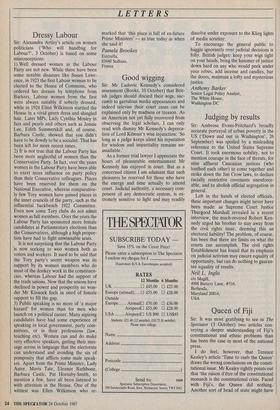LETTERS
Dressy Labour
Sir: Alexandra Artley's article on women politicians ('Who will handbag for Labour?', 3 October) is based on some misconceptions: 1) Well dressed women in the Labour Party are not new. While there have been some notable disasters like Susan Lawr- ence, in 1923 the first Labour woman to be elected to the House of Commons, who ordered her dresses by telephone from Barkers, Labour women from the first were always suitably if soberly dressed, while in 1924 Ellen Wilkinson startled the House in a vivid green dress and shingled hair. Later MPs, Lady Cynthia Mosley in furs and pearls and others such as Jennie Lee, Edith Summerskill and, of course, Barbara Castle, showed that you didn't have to be dowdy to be a socialist. That has been left for more recent times.
2) It is not true that the Labour Party has been more neglectful of women than the Conservative Party. In fact, over the years women in the Labour Party have been able to exert more influence on party policy than their Conservative colleagues. Places have been reserved for them on the National Executive, whereas comparative- ly few Tory women have gained places in the inner councils of the party, such as the influential backbench 1922 Committee.
Even now some Tory clubs do not admit women as full members. Over the years the Labour Party has sponsored more female candidates at Parliamentary elections than the Conservatives, although a high propor- tion have had to fight unwinnable seats.
It is not surprising that the Labour Party is now seeking to woo women both as
voters and workers. It used to be said that
the Tory party's secret weapon was its support by its women members who do most of the donkey work in the constituen- cies, whereas Labour had the support of the trade unions. Now that the unions have declined in power and prosperity no won- der Mr Kinnock feels in need of female support to fill the gap.
3) Public speaking is no more of 'a major hazard' for women than for men who launch on a political career. Many aspiring candidates have had some experience of speaking in local government, party com- mittees, or in their professions (law, teaching etc). Women can and do make very effective speakers, getting their mes- sage across in language that the electorate can understand and avoiding the sin of pomposity that afflicts some male speak- ers. Apart from the Prime Minister, Lady Astor, Mavis Tate, Eleanor Rathbone, Barbara Castle, Pat Hornsby-Smith, to mention a few, have all been listened to with attention in the House. One of the wittiest was Ellen Wilkinson who re- marked that 'this place is full of ex-future Prime Ministers' — as true today as when she said it!
Pamela Brookes
Esterella, 83440 Seillans, France


















































 Previous page
Previous page